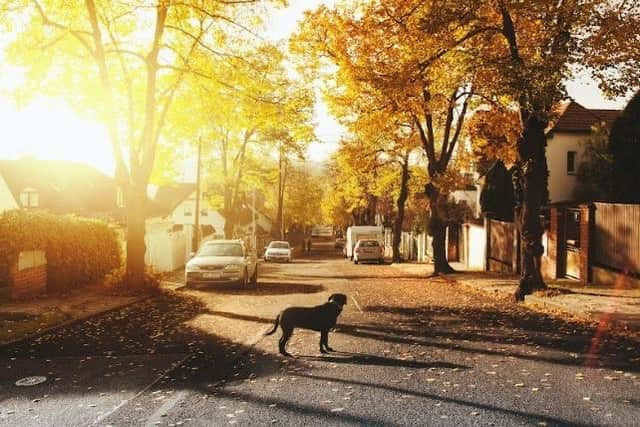Here’s why dog owners need to be extra vigilant this New Year's Eve
and live on Freeview channel 276
Google searches for ‘how to find a missing dog’ are up 120 per cent in the last month alone, and with both Bonfire Night and Diwali having occurred last month, fireworks may well be the cause.
The experts at Animal Friends Pet Insurance have shared their advice on keeping your pooch safe during fireworks, as well as what to do if your pet unfortunately goes missing around New Year’s Eve.
Advertisement
Hide AdAdvertisement
Hide AdCatrin George, animal wellbeing specialist at Animal Friends Pet Insurance, said: “During fireworks season, always ensure that all doors, cat flaps, and gates are locked shut.


"Even if your dog is trained to stay close, when anxious and scared, pets tend to run away, as their instinct to flee from perceived dangers kicks in.
“You should also try to make your pet feel safe by reducing the noise of the fireworks by drawing curtains, keeping windows closed and playing a calming playlist with both classical and reggae music known to be effective.
"You can even create a safe-space or den with beds and blankets for your dog or cat to withdraw to when they need.
Advertisement
Hide AdAdvertisement
Hide Ad“Be sure to walk your dog earlier in the day too so you can avoid being outside with them when the fireworks start, this way, you can try and get them comfortable and settled before the loud bangs begin, and reduce any chance of them running off in fright.
“If you own a pet that you know struggles when they hear fireworks, to make sure you’re fully prepared should the worst happen, take a couple of minutes to check that their microchip details are up to date and their ID tags are safely secured to their collars.”
For any pet-parents whose pooch has sadly gone missing, Catrin shares her expert tips to follow for the best chances of reunification:
Report your pet missing
The first step to take is to report your pet as missing to your microchip database to ensure that if your pet is found and their microchip is scanned by a vet or local authority, you’re able to be reunited quicker.
Utilise social media
Advertisement
Hide AdAdvertisement
Hide AdSocial media is a fantastic tool allowing you to reach the masses at the touch of a button, there are many Facebook, Instagram and other social media pages dedicated to reuniting lost and stolen pets with their owners, as well as local resident groups that are full of people that might be able to help.
It’s important to ensure you’re being safe whilst posting about your lost pet on social media, for example, never include your address on any public posts. Post clear images of your pet, any significant markings that could help identify them, plus the best way to contact you if they’re found.
If your pet has insurance, it's always worth checking if your policy offers a lost or stolen advertising or reward benefit to help you increase your chances of being reunited with your dog or cat.
Call local vets
If your dog is found, the individual who found them should take them to the nearest vet who will scan their microchip. It’s worth ringing around any vet offices in your local area to flag that your dog has gone missing, and check whether any dogs of a similar description have been brought in since you last saw your pup. You can also call local rescue centres too as some also help with lost pets.
Revisit the area where you last saw them
Advertisement
Hide AdAdvertisement
Hide AdWhile it may be a long shot, posting flyers in the surrounding areas will help raise awareness and alert fellow animal lovers to keep a look out and get in touch if they see a similar-looking dog.
What to do if you find a lost dog:
If you see a dog looking lost, with no owner around, there are some steps to take to ensure you can help reunite them with their loved ones.
Catrin said: “It’s heartbreaking to see a dog in distress, but if you find a lost dog, you can make a real difference by helping them back to their owners.
“A lost pet can be frustrated, scared and stressed, and as you don’t know them, be very careful as to how you approach them as you don’t know how they might react. If you’re able to slowly approach a lost dog and they’re happy to cooperate, try and get them on a lead to ensure they don’t run away, and take them to the nearest vets.
Advertisement
Hide AdAdvertisement
Hide Ad“The vets will be able to help with scanning for a microchip, which will hopefully lead to contacting the owner, and reuniting the pooch with their family.”
The importance of microchips:
Catrin said: “The main thing we would like pet owners to take from our advice is to ensure that your pet is microchipped and that your contact details are up to date on the microchipping database. It
is a legal requirement for dogs over the age of eight weeks to be microchipped, and the law to microchip cats is coming into effect in June 2024.
“A recent survey from Dogs Trust revealed that last year, more than 4,000 dogs were unable to reunite with their owners due to their microchip contact details being incorrect, so pet-parents must prioritise keeping these updated to be in with the best chance of finding their pets should they go missing.”
For more information on how to calm your pets during fireworks season, click here.